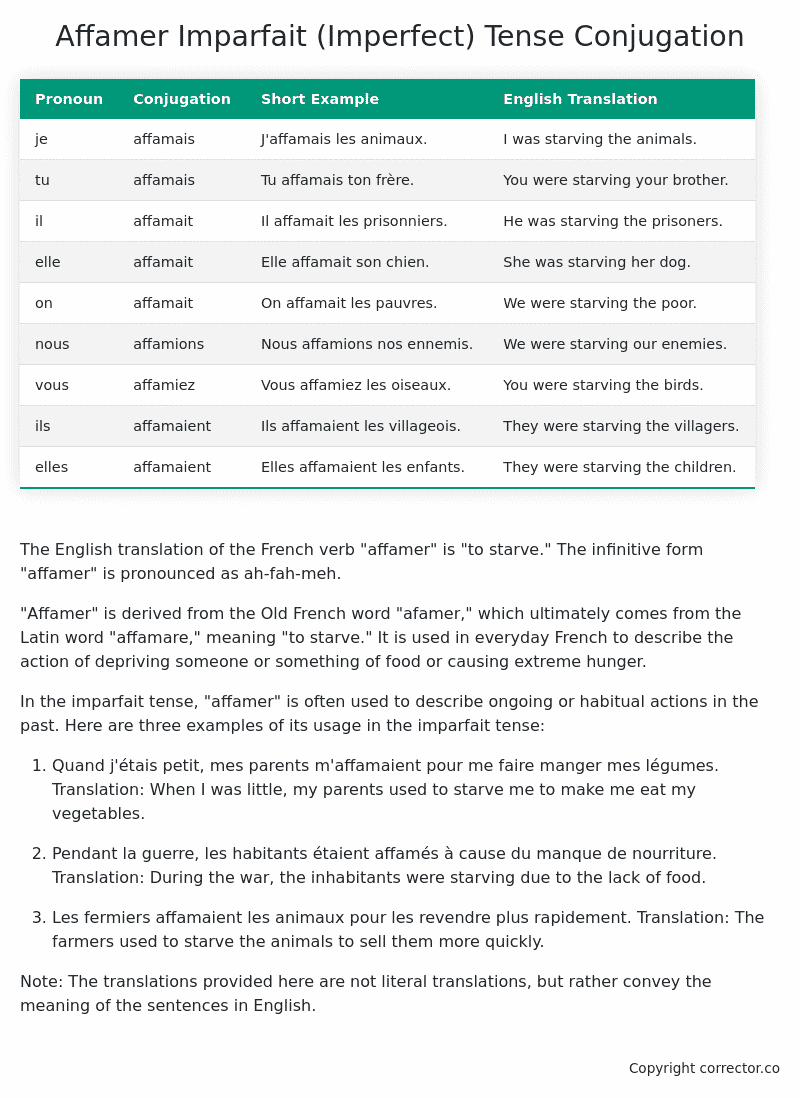Imparfait (Imperfect) Tense Conjugation of the French Verb affamer
Introduction to the verb affamer
The English translation of the French verb “affamer” is “to starve.” The infinitive form “affamer” is pronounced as ah-fah-meh.
“Affamer” is derived from the Old French word “afamer,” which ultimately comes from the Latin word “affamare,” meaning “to starve.” It is used in everyday French to describe the action of depriving someone or something of food or causing extreme hunger.
In the imparfait tense, “affamer” is often used to describe ongoing or habitual actions in the past. Here are three examples of its usage in the imparfait tense:
-
Quand j’étais petit, mes parents m’affamaient pour me faire manger mes légumes.
Translation: When I was little, my parents used to starve me to make me eat my vegetables. -
Pendant la guerre, les habitants étaient affamés à cause du manque de nourriture.
Translation: During the war, the inhabitants were starving due to the lack of food. -
Les fermiers affamaient les animaux pour les revendre plus rapidement.
Translation: The farmers used to starve the animals to sell them more quickly.
Note: The translations provided here are not literal translations, but rather convey the meaning of the sentences in English.
Table of the Imparfait (Imperfect) Tense Conjugation of affamer
| Pronoun | Conjugation | Short Example | English Translation |
|---|---|---|---|
| je | affamais | J’affamais les animaux. | I was starving the animals. |
| tu | affamais | Tu affamais ton frère. | You were starving your brother. |
| il | affamait | Il affamait les prisonniers. | He was starving the prisoners. |
| elle | affamait | Elle affamait son chien. | She was starving her dog. |
| on | affamait | On affamait les pauvres. | We were starving the poor. |
| nous | affamions | Nous affamions nos ennemis. | We were starving our enemies. |
| vous | affamiez | Vous affamiez les oiseaux. | You were starving the birds. |
| ils | affamaient | Ils affamaient les villageois. | They were starving the villagers. |
| elles | affamaient | Elles affamaient les enfants. | They were starving the children. |
Other Conjugations for Affamer.
Le Present (Present Tense) Conjugation of the French Verb affamer
Imparfait (Imperfect) Tense Conjugation of the French Verb affamer (You’re reading it right now!)
Passé Simple (Simple Past) Tense Conjugation of the French Verb affamer
Passé Composé (Present Perfect) Tense Conjugation of the French Verb affamer
Futur Simple (Simple Future) Tense Conjugation of the French Verb affamer
Futur Proche (Near Future) Tense Conjugation of the French Verb affamer
Plus-que-parfait (Pluperfect) Tense Conjugation of the French Verb affamer
Passé Antérieur (Past Anterior) Tense Conjugation of the French Verb affamer
Futur Antérieur (Future Anterior) Tense Conjugation of the French Verb affamer
Subjonctif Présent (Subjunctive Present) Tense Conjugation of the French Verb affamer
Subjonctif Passé (Subjunctive Past) Tense Conjugation of the French Verb affamer
Subjonctif Imparfait (Subjunctive Imperfect) Tense Conjugation of the French Verb affamer
Subjonctif Plus-que-parfait (Subjunctive Pluperfect) Tense Conjugation of the French Verb affamer
Conditionnel Présent (Conditional Present) Tense Conjugation of the French Verb affamer
Conditionnel Passé (Conditional Past) Tense Conjugation of the French Verb affamer
Conditionnel Passé II (Conditional Past II) Tense Conjugation of the French Verb affamer
L’impératif Présent (Imperative Present) Tense Conjugation of the French Verb affamer
L’impératif Passé (Imperative Past) Tense Conjugation of the French Verb affamer
L’infinitif Présent (Infinitive Present) Tense Conjugation of the French Verb affamer
L’infinitif Passé (Infinitive Past) Tense Conjugation of the French Verb affamer
Le Participe Présent (Present Participle) Tense Conjugation of the French Verb affamer
Le Participe Passé (Past Participle) Tense Conjugation of the French Verb affamer
Struggling with French verbs or the language in general? Why not use our free French Grammar Checker – no registration required!
Get a FREE Download Study Sheet of this Conjugation 🔥
Simply right click the image below, click “save image” and get your free reference for the affamer present tense conjugation!

Affamer – About the French Imparfait Tense
NOTE: To take a deep dive into all the French tenses then see our article on Mastering French Tense Conjugation.
Formation of the Imparfait Tense
For regular -er verbs:
For regular -ir verbs
For regular -re verbs
Common Everyday Usage Patterns
Description of Past Habits
Background Information
Mental and Emotional States
It’s employed to express emotions, thoughts, or physical sensations in the past. For example: “J’étais content quand il est arrivé.” (I was happy when he arrived.)
Ongoing Actions
Points to Note About the Imparfait Tense
Passé Composé vs. Imparfait
Conditional
Si Clauses
Narration
I hope you enjoyed this article on the verb affamer. Still in a learning mood? Check out another TOTALLY random French verb imparfait conjugation!


